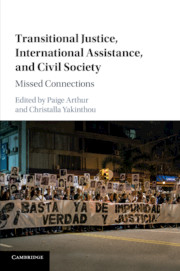Book contents
- Transitional Justice, International Assistance, and Civil Society
- Transitional Justice, International Assistance, and Civil Society
- Copyright page
- Contents
- Tables
- Contributors
- Foreword
- Acknowledgments
- Introduction Changing Contexts of International Assistance to Transitional Justice
- Part I Understanding the Cases
- Part II Conceptualizing the Connections
- 6 Reframing Friction
- 7 Why Do Donors Choose to Fund Transitional Justice?
- Conclusion Refocusing on Civil Society: How to Make – not Miss – Connections
- Annex: Interview Guides
- Index
7 - Why Do Donors Choose to Fund Transitional Justice?
from Part II - Conceptualizing the Connections
Published online by Cambridge University Press: 23 March 2018
- Transitional Justice, International Assistance, and Civil Society
- Transitional Justice, International Assistance, and Civil Society
- Copyright page
- Contents
- Tables
- Contributors
- Foreword
- Acknowledgments
- Introduction Changing Contexts of International Assistance to Transitional Justice
- Part I Understanding the Cases
- Part II Conceptualizing the Connections
- 6 Reframing Friction
- 7 Why Do Donors Choose to Fund Transitional Justice?
- Conclusion Refocusing on Civil Society: How to Make – not Miss – Connections
- Annex: Interview Guides
- Index
Summary
- Type
- Chapter
- Information
- Transitional Justice, International Assistance, and Civil SocietyMissed Connections, pp. 209 - 241Publisher: Cambridge University PressPrint publication year: 2018
- 2
- Cited by



